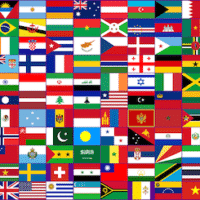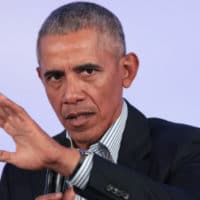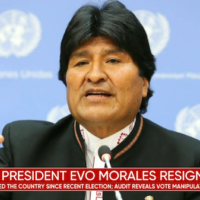-
An alternative to liberal globalization
In the Bandung Conference of 1955, the governments and peoples of Asia and Africa expressed their ambitions to reconstruct a global system based on the recognition of the rights of countries that had previously been under the yoke of colonialism. In that period, “the rights to development,” as applied to the frameworks for negotiating multipolarity constituted the basis of globalization. These rights would force the imperial powers to adapt to new realities.
-
Emissions Gap Report 2019: Executive Summary
This is the tenth edition of the United Nations Environment Programme (UNEP) Emissions Gap Report. It provides the latest assessment of scientific studies on current and estimated future greenhouse gas (GHG) emissions and compares these with the emission levels permissible for the world to progress on a least-cost pathway to achieve the goals of the Paris Agreement.
-
The Electoral College’s racist origins
The nation’s oldest structural racial entitlement program is one of its most consequential: the Electoral College.
-
Obama privately considered leading ‘stop-Bernie campaign’ to combat Sanders 2020 surge: Report
“From lofty heights, Obama has now become a dampener of hope, a barrier to change, and a threat to progress.”
-
How racism works today
With racist speech and sentiments coming more to the fore in current Irish politics, campaigner John Molyneux takes a look at how racist ideas and language work today.
-
How Human Rights Watch whitewashed a right-wing massacre in Bolivia
While some may be surprised by its response to the Bolivia crisis, Human Rights Watch’s support for a U.S.-backed right-wing coup is no aberration.
-
Green Strategy: To beat climate change, humanity needs socialism
It’s bad enough to imagine blame and scenarios of dread, as if from science fiction, but add in the presently feeble response to dire threats and we’re in a funk. If tools were available, we’d get a lift. Marc Brodine’s book Green Strategy, reviewed here, is about tools.
-
BBC attacks Corbyn over his correct stance on foreign wars
Corbyn’s position on Britain’s military adventures has been right on every occasion, argues Chris Nineham.
-
Elizabeth Warren endorses Trump’s economic war on Venezuela, then soft-pedals far-right Bolivia coup
In a nauseating interview on Pod Save America, Elizabeth Warren endorsed suffocating US sanctions on Venezuela, backing Trump’s strategy to stop its “ability to have an economy” while parroting neocon regime-change myths. She then whitewashed the far-right military coup in Bolivia.
-
Thousands march in response to Cochabamba massacre as the dictatorship prepares for a State of siege
The Bolivian security forces set up road blocks across Cochabamba today as mass demonstrations are taking place against the brutal attacks carried out against the people last week.
-
‘Orwellian absurdity’: U.S. reversal on settlements draws international outrage
U.S. Secretary of State Mike Pompeo announced on Monday that the U.S. was softening its position on Israel’s network of settlements in the occupied Palestinain territory, saying it was revoking the notion that settlements are illegal under international law—a notion recognized by the rest of the world as factual and true.
-
Bolivia coup led by Christian fascist paramilitary leader and millionaire–with foreign support
Bolivian coup leader Luis Fernando Camacho is a far-right multi-millionaire who arose from fascist movements in the Santa Cruz region, where the US has encouraged separatism. He has courted support from Colombia, Brazil, and the Venezuelan opposition.
-
Inferno and the plan of the Coup d’Etat in Bolivia
Each night there are vigils, fires, an unwavering decision: the historic, Aymara, ancient, and more recent memory of the 2003 uprising where sixty people were killed.
-
The clear U.S. role in Bolivia’s tragic hard-right coup
With the backing of the U.S. government, a highly sophisticated and well-resourced coup has succeeded in overthrowing Bolivia’s legitimate and democratically elected president Evo Morales. This massive blow against democracy and social progress comes after more than a decade of U.S. intervention aimed at destabilising Bolivia and overthrowing its successful socialist government.
-
Communiqué of the Movement to Socialism (MAS-IPSP)
The Bolivian people are living through terrible moments, with police officers and motorcyclists storm the streets and the military high command deciding to attack the citizens as a means of pacification, including preventing prominent people, religious leaders and political leaders from finding constitutional and democratic solutions to the crisis we are facing.
-
The Bolivian coup is not a coup—because U.S. wanted it to happen
Army generals appearing on television to demand the resignation and arrest of an elected civilian head of state seems like a textbook example of a coup. And yet that is certainly not how corporate media are presenting the weekend’s events in Bolivia.
-
Behind the racist coup in Bolivia
Sunday November the 10th, at approximately 4pm (eastern standard time) the democratically elected president and vice president of Bolivia, Evo Morales and Álvaro García respectively, were forced to resign from power.
-
Bolivia does not exist
On November 10, Bolivia’s President Evo Morales Ayma was removed from office.
-
The 2019 UN vote against the U.S. blockade of Cuba
Trump’s Washington Remains Cornered
-
5 fast facts about the military coup in Bolivia and what you can do
Despite what the mainstream media headlines would have you believe, a coup is underway in Bolivia.




















